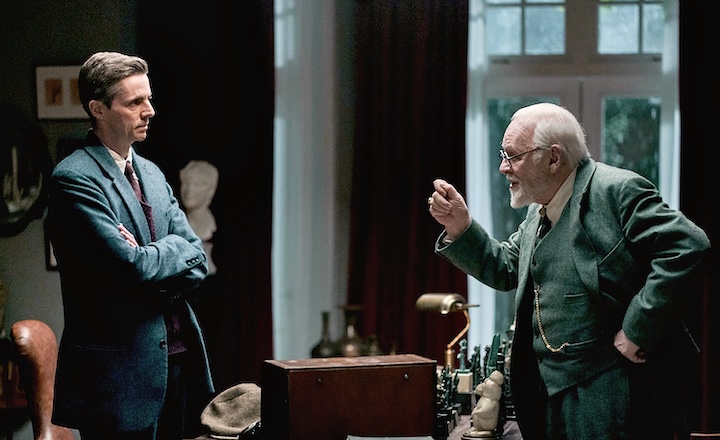As I walked through the wilderness of this world, I lighted on a certain place where was a Den, and I laid me down in that place to sleep: and, as I slept, I dreamed a dream. – Bunyan’s Pilgrim’s Progress (1678)
Freud’s Last Session, a recent film directed by Matthew Brown, is based upon the play by Mark St. Germain who wrote the film’s screenplay with Mr. Brown. Both film and play had their genesis in a book by Armand Nicholi: The Question of God: C.S. Lewis and Sigmund Freud Debate God, Love, Sex, and the Meaning of Life. Dr. Nicholi, a psychiatrist, had for years taught a popular course at Harvard on just that subject, engaging students in the conflict between the secular and the religious, contrasting two powerful human emotions, despair and hope.
As the movie begins, we see images of antisemitism, and of Jews and other religious figures, including Jesus – from the Shroud of Turin. We enter the den in Freud’s London house, which is filled with artifacts, including effigies of ancient deities, almost a museum, one might say, of totems and taboos.
Freud (played by Anthony Hopkins) has invited Lewis (Matthew Goode) to his London home to discuss religious belief, something Freud rejects as childish fantasy. Of course, the encounter devolves into a therapy session with the twist that each man takes a crack at finding chinks in the other’s psycho-philosophical armor.
Freud escaped Vienna after the Anschluss, came to London in 1938, and as he and Lewis meet a year later, WWII air-raid sirens wail, and Lewis begins to suffer PTSD flashbacks from his service in WWI’s trenches.
It’s September 3, 1939, and Freud begins his “last” analysis session – last because he will soon die. Suffering the effects of buccal (oral) cancer, the result of years of cigar smoking, Freud died twenty days later, although not from cancer. At his request, a physician friend administered lethal injections of morphine.
Assisted suicide: despair unresolved.
Now, this extraordinary encounter between Freud and Lewis never took place. Or, I should say, there is no certainty that they were ever together – just a cryptic note in Freud’s appointment book about a meeting with an “Oxford don” on that date. So, it could have been any one of the Inklings: Barfield, Cecil, Williams, Dyson, or Tolkien. It could have been a professor of biology or physics.
What had been a 2-person stage play becomes a film with more than 2-dozen roles – added presumably to give depth and color to the drama. I’ve not seen the play, but I suspect, mano a mano, it worked better. Others in the screen version seem there for extraneous reasons.
The single exception is Freud’s daughter, Anna (German actress Liv Lisa Fries), and the added frisson she brings because she’s in a sexual relationship with an American woman, Dorothy Burlingham (Jodi Balfour), as Anna was in real life.

Ironically, this upsets the man for whom sexuality seemed to ooze into every nook and cranny of psychoanalysis. Freud thought same-sex attraction among males was neurotic but among women likelier psychotic. Worse for him: he thought lesbianism arose from failed father-daughter relationships.
He even broke one of his own rules about conducting therapy by taking on his daughter as a patient. Her presence in the film would seem superfluous, were it not for the fact that it deepens her father’s angst.
Sigmund Freud’s despair is, of course, counterpointed by the Christian hope of C.S. Lewis, although there’s no Christian triumphalism in the back-and-forth between the two. And it’s fair to say that, in the end, the match is a draw. If anybody could have crushed Lewis’s spirit, it might have been Freud. If anybody could have caused Freud to fall to his knees in prayer, it might have been Lewis. But both are unchanged, which is the film’s main failing.
To the extent that Lewis might have made the case for God, it would have been by going back to basics – the proofs of Aquinas, for instance. But what’s basic here comes down to sex.
Out of a flashback sequence about Mrs. Janie Moore (the mother of one of Lewis’s comrades in arms killed in the Great War) with whom Lewis went on to live and – the received opinion is – have a sexual relationship, Freud rather gleefully seizes upon the opportunity to rehash his theory of the Oedipal complex.
Sex aside, the conceit of the film is that the real impetus for the meeting was Lewis’ 1933 book The Pilgrim’s Regress, in which Lewis parodied Freudianism as the governing philosophy of a place called Eschropolis, Greek for ugly city. Freud claims not to have read the book, but as they part, he slips something into Lewis’s jacket pocket.
On the train back to Oxford, Lewis remembers the gift, takes it from his pocket, and it’s a copy of The Pilgrim’s Regress in which Freud has written, “From error to error, one discovers the entire truth.” It’s a famous Freud quotation.
Perhaps it’s meant to suggest that we all stumble along until we come to clarity and commitment. As Chesterton put it in Orthodoxy (1908):
there are an infinity of angles at which one falls, only one at which one stands. . . .[And] to have avoided them all [fads ancient and modern] has been one whirling adventure; and in my vision the heavenly chariot flies thundering through the ages, the dull heresies sprawling and prostrate, the wild truth reeling but erect.”
Or as Dr. Nicholi wrote about the divergence of Freud and Lewis:
One view claims that the universe is. . .a painful riddle that causes great anxiety and despair and bitterness. The other views death as the final step. . .of what Lewis called “that grand miracle,” the resurrection.
_____
Freud’s Last Session is rated PG-13 and runs just 108 minutes. It is now available on YouTube and other streaming services.















